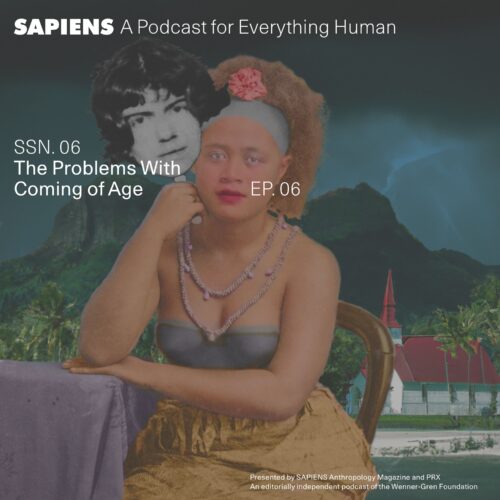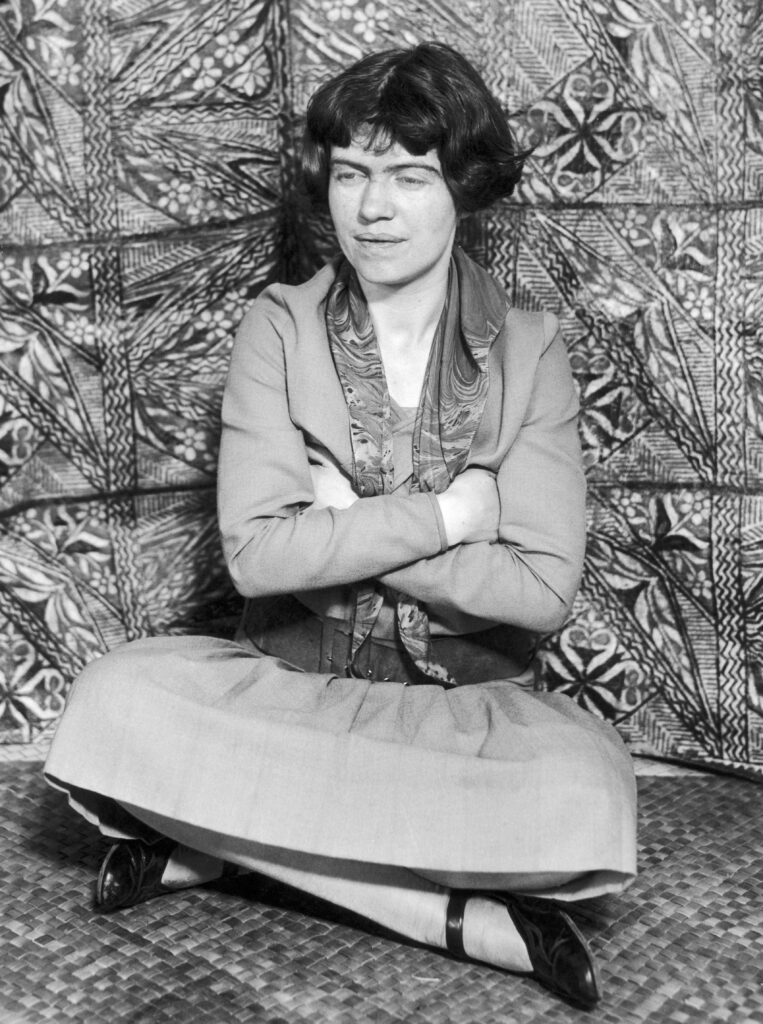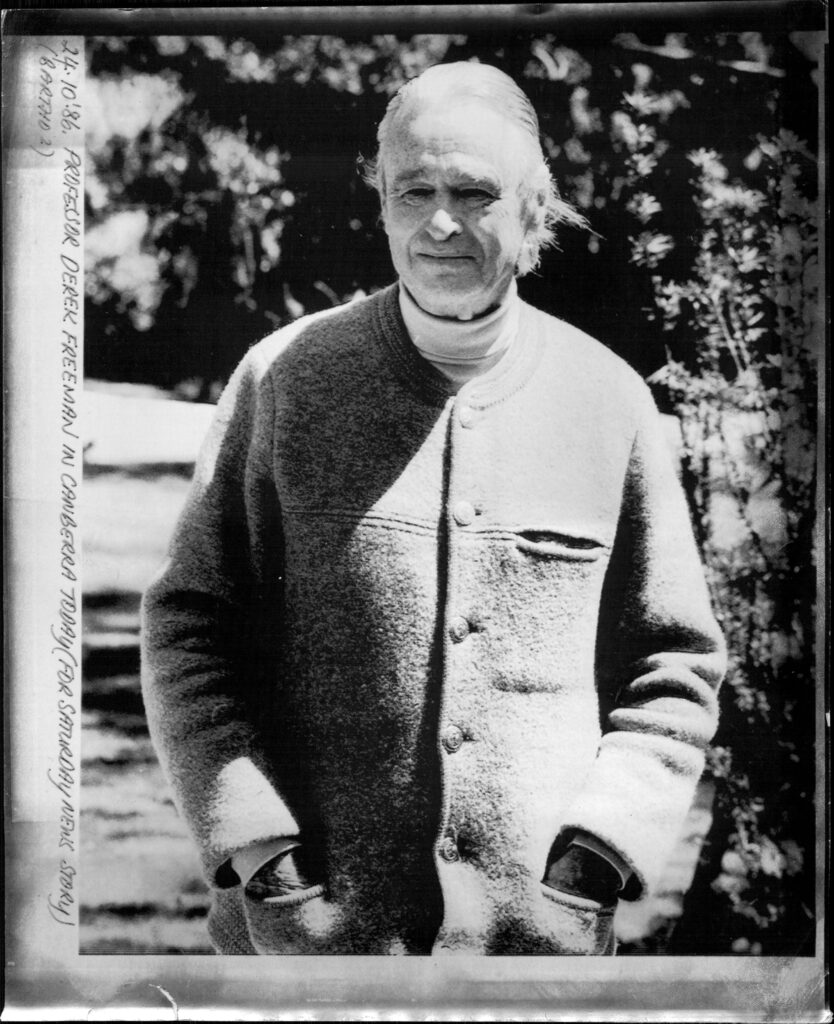After anthropologist Derek Freeman publishes Margaret Mead and Samoa: The Making and Unmaking of an Anthropological Myth, the controversy heats up. Op-eds, documentaries, censure by a leading anthropological organization, and even a debate on The Phil Donahue Show all follow.
Was Margaret Mead, “the grandmother of the world,” wrong? Or was Freeman?
At stake was the heart of an academic discipline and understandings of the nature of being human. Mead’s daughter, Mary Catherine Bateson, launches a defense, and other anthropologists weigh in too.
See the companion teaching units, “Unpacking the Mead-Freeman Controversy” and “The Influence of Freeman and Mead.”
This episode is included in Season 6 of the SAPIENS podcast, which was made possible by a grant from the National Endowment for the Humanities.
Sex, Lies, and Science Wars
[introductory music]
Voice 1: What makes us human?
Voice 2: Who you are.
Voice 3: History.
Voice 4: Your function in community. That’s where we find our purpose.
Voice 5: We are profoundly connected as human beings.
Voice 6: What makes us human?
Voice 7: Let’s find out.
Voice 8: SAPIENS.
Voice 9: A Podcast for Everything Human.
Bradd Shore: It was the single biggest media storm in the history of anthropology. And every day, I would go in and there would be 40 or 50 messages: Please call The New York Times. Please call Life magazine.
Kate Ellis: In 1983, Emory University anthropologist Bradd Shore was in high demand. He’d recently published a book about Samoa, so when Derek Freeman’s critique of Margaret Mead came out, the media turned to Shore.
Bradd: I was called by “The [Phil] Donahue Show,” and my first reaction was, “You need to get an anthropologist who’s more senior, who’s older.” So I suggested my adviser Marshall Sahlins, who was among the most famous anthropologists in the country and who didn’t do work in Samoa but was a Polynesian specialist.
Marshall refused to go on. Nobody would go on with Derek Freeman because of Derek Freeman’s reputation of being … how can I put this nicely? Derek Freeman had a very colorful reputation of being a little bit off his rocker.
Kate: This is The Problems With Coming of Age, a podcast from SAPIENS. Today’s episode: “Sex, Lies, and Culture Wars.” I’m Kate Ellis.
We left Derek Freeman finally sending Margaret Mead a draft of his critique of her research. He’d spent almost two decades working on the project. After his time in Samoa, he was convinced that she’d gotten it wrong. Samoa wasn’t a place of sexual liberation where adolescents were free to come of age without storm and stress.
Rather, it was a regimented culture where virginity was highly prized. And to Freeman, Mead wasn’t just wrong because of her interpretation of what she said she’d witnessed. She was wrong because she ignored the importance of biology. That is, in his view, the all important influence of genes and evolution on behavior. And this part of his critique—his insistence that nature trumped nurture—kick-started a media firestorm.
Virginia Yans-McLaughlin: You would see stories on major newspapers, front page stories, about this, and that is very unusual.
Kate: Virginia, or Ginny, Yans-Mclaughlin is a professor emerita of history at Rutgers University. When the Mead–Freeman controversy erupted, Yans-McLaughlin had already been researching Margaret Mead for a few years. She was surprised by the media’s sudden focus.
Virginia: You had to ask the question, “Why are these people so interested in this?” And the answer is that she was a symbol for American liberalism, which was under attack.
Kate: The Mead–Freeman debate became a proxy for the culture wars between U.S. liberals and conservatives in the 1980s..
Virginia: She suffered the misfortune of being famous during the time of the culture wars when political actors, most of them in the Republican Party, were interested in attaching negatives to liberalism. And Mead, I would say, was a representative for liberal thinking about childrearing, about sex roles, about marriage.
Kate: In Coming of Age in Samoa, one of Mead’s most provocative conclusions was that norms were contextual, that society could change, suggesting perhaps that society should change. During the 1970s, as movements for racial justice, gay liberation, and women’s rights expanded, there was a right-wing backlash.
At stake in the culture wars was nothing less than our most basic understanding of who we are as humans. The question was: “Are parts of our identities, like gender and race, inherent and unchangeable, or are they socially constructed and fluid?”
Mead’s work supported the latter, not only her research in Samoa but her later work in New Guinea, which was published in her book Sex and Temperament in Three Primitive Societies. That was one of the first books to explore what we now call gender identity.
Mead’s understanding that traits and behavior reflect context is known as the cultural determinist viewpoint. And even though Mead didn’t consider herself a feminist, she’d become a symbol of liberal and progressive ideas in the U.S.
As Yans-McLaughlin remembers it …
Virginia: She would get on TV with people like Dick Cavett, and she would say all kinds of things that I thought were just terrific:
Margaret Mead archival audio: Look, there isn’t going to be one kind of family in the year 2000. We’re moving toward a world with options. There won’t be such a thing as the “family.” The family, in general, is a crazy piece of fiction and statistical abstraction.
Kate: By the late 1970s, Mead had become a public icon.
Virginia: She was very aware of how to present herself as a public persona. She would walk around with a cape and a very high, tall walking stick with a “y” at the top where she could put her hand. Some people said it looked like she was a bishop with a cape and a cross or something, but her cape and her walking stick were her symbols.
Kate: In part because of Mead’s celebrity status, when Derek Freeman came out with his book critiquing her, Margaret Mead and Samoa: The Making and Unmaking of an Anthropological Myth, it got traction beyond the world of academic anthropologists. And even before most people had even read Freeman’s book, the controversy was juicy enough for national TV.
Bradd: It was not that I was trying for television fame. I really didn’t want it. I knew that this was dangerous, that you could end up looking like a fool, and I didn’t have a lot of experience on the media. I was relatively young and inexperienced with this sort of thing.
Kate: In March of 1983, Bradd Shore, Derek Freeman, and Mary Catherine Bateson—Margaret Mead’s daughter—appeared on The Phil Donahue Show, a nationally syndicated daytime talk show that reached some 8 million viewers. Bradd Shore was nervous.
Bradd: I had made the request that Freeman and I not be put at the same hotel because I did not know what he had in mind, and that he, in my view, was capable of violence. I didn’t know for sure, but I knew it was possible.
Kate: Shore worked on his talking points. The next morning, he headed to the studio. The show was recorded live.
[The Phil Donahue Show theme music]
Bradd: So we went on the show, and Derek Freeman walks in with a walking stick, just like Margaret Mead had, and a cape. And I thought to myself, “Oh my God, he’s taken over her.” And he turned to Catherine Bateson and sat down next to her and said, “Don’t mind that young guy over there. We’re gonna deal with him.” And Catherine Bateson looked at him and she said, “What are you talking about? I have no interest in anything that you’ve said.”
Kate: Mary Catherine Bateson represented her mother on the show. The SAPIENS team was fortunate to have recorded an interview with her before she passed away in 2021.
Mary Catherine Bateson: He was very hard to interrupt. You know, he would just go on. But there are things that you can do to interrupt people. And I, mischievously and quite purposefully, said, “Oh, Dr. Freeman, but I’m so glad to have …you’re the one who made me go back and read my mother’s book again and see how good it was.” And that stopped him cold, briefly.
Kate: Paul Shankman, University of Colorado, Boulder, anthropologist, remembers watching the show. There was a point when Freeman was arguing that Mead was an absolute cultural determinist. All nurture, no nature.
[music]
Paul Shankman: Catherine Bateson steps in and corrects Freeman. She says that everyone knows that human beings have basic biological needs, like people need food to live. But how that is expressed is quite variable across cultures—how people produce what they eat, how they consume it, how they distribute it. All of these ways involve culture as well as a basic biological need.
Bradd Shore comes in and talks about how biology was used in the early 20th century to bolster racial hierarchies and racism that ultimately led to Hitler’s ideology and the Holocaust and how Margaret Mead actually was involved in the campaign to promote culture as an alternative way of explaining human behavior rather than relying exclusively on human biology.
So Freeman is listening to this and shaking his head, and he says directly to Bateson and Shore that they don’t know what they’re talking about.
Kate: Things got heated. Just listen to this clip.
Derek Freeman: I was made a Samoan chief. This boy is untitled.
Bradd: No, I have a Ph.D., my friend.
Kate: Freeman’s posturing didn’t seem to be just for show …
Bradd: And whenever there would be a break, a commercial break, the lights would go off, and Freeman would lean over and say, “I’m going to get you.” He would try to threaten me.
Kate: For some watching the show, it cemented their thinking that Freeman wasn’t to be trusted, that he was out to get Mead. Freeman’s biographer Peter Hempenstall says that North American anthropologists were keen to defend Margaret Mead and her legacy.
Peter Hempenstall: I think there was a certain nationalist, patriotic grouping around her during this campaign as though she had to be protected and defended against this upstart.
Kate: Throughout the show, Freeman behaved as he always did: intent on calling out any and all errors.
Peter: He had a very unfortunate way of dealing with critics. He was a fierce intellectual who took no prisoners. He never lost an argument. And he wanted to make sure that people recognized that.
Kate: The day after the show, Shore got a call from another anthropologist.
Bradd: And he said to me, “I’m sorry, Bradd.” I said, “What do you mean?” He says, “I saw the show.”
Kate: Shore’s colleague had praised Freeman’s book. But watching Freeman on Donahue made him regret it.
Bradd: He said, “I have a blurb on the back of Freeman’s book recommending it as a biological anthropologist, and Freeman is sick.” I said, “How do you know that?” He said, “I’m a doctor. I’m trained in medicine.”
Kate: Derek Freeman’s mental health was a theme that came up in a lot of conversations we had with people who’d interacted with him personally. Three of the academics we spoke with said he attacked their credentials and work, going so far as to contact the institutions that had issued their degrees and demanding that they be rescinded. That’s after the break.
[break]
Kate: You’re listening to The Problems With Coming of Age. We were talking about how Derek Freeman could be a difficult person. And when he disagreed with someone, he often took it pretty far.
Virginia: He researched me and researched my whole career and then wrote me a letter about it.
Kate: This is Ginny Yans-McLaughlin again.
Virginia: It was just very strange, you know, questioning courses I had taught, questioning my credentials. It just was not a balanced, healthy individual that I was working with. And I just ignored it. I wasn’t going to respond to that.
It bordered on violating my privacy, let’s put it that way. This person has issues.
Kate: Multiple people we spoke with commented on Freeman’s mental health.
Peter: It turns out in fact that he was finally diagnosed in the 1970s as being bipolar, which wasn’t a condition that was much recognized then.
Kate: Freeman’s biographer Peter Hempenstall again.
Peter: And he’d had some instances of manic depressive episodes while he was in Southeast Asia and even indeed one in Samoa in the 1960s, all of which, I have to say, had been used as evidence by some of his critics to claim that he had some major mental health disturbances and, and I think that’s probably true.
Kate: It’s hard to know how much of Freeman’s hostility toward Mead came from his personality, his mental state … and how much from a genuine disagreement with her findings. After all, he’d spent far more time in Samoa than she had, albeit a different part and at a different time..
Of course, plenty of people that struggle with mental health issues don’t take it out on their colleagues. And Hempenstall says we can’t write off Freeman’s critique of Mead because of whatever he was struggling with. That ignores the potential validity of Freeman’s findings and arguments.
Peter: A lot of what he said was often obscured by the projection of his own personality into the debates. And so Derek Freeman the monster became actually the main message of a lot of his writings rather than the actual message that Derek Freeman was putting on the page.
Kate: That actual message was that anthropology had to position itself as a science, one rooted in biology.
Peter: He wanted anthropology to become something other than simply the ethnographic study of cultures because he believed that to understand cultures, to understand humans within culture, you had to understand their genetic background and the evolution of genetic breeding groups and so forth and so on.
Kate: But many anthropologists found these ideas troubling.
Bradd: The virulence of the response and the defensiveness of American anthropologists, cultural anthropologists, against Freeman had to do with the fact that they saw in this book a potential for the reemergence of a biological vision of behavior that would have the possibility of racist overtones.
Kate: If one of the goals of anthropology was to understand different cultures and people—and behavior was determined by biology—the next step would be to start comparing the biology of different people. To a lot of anthropologists, this looked like scientific racism all over again. Plus, he’d chosen Margaret Mead as his target.
Peter: The anthropological establishment in North America came down very heavily against him, claiming that he was carrying out a vendetta against this sacred woman, Margaret Mead, who’d been such a major figure for not just American anthropology but for American social science and public commentary in general—one of the great public intellectuals of the 20th century.
Kate: When the American Anthropological Association held its annual meeting in 1983—it was in Chicago—its members passed a motion declaring Freeman’s book, “poorly written, unscientific, irresponsible, and misleading.”
Freeman thought it was absurd for a question of science, of anthropology, to be decided by a vote. But while Freeman had largely convinced the public of his critique, in academia he lost ground. His reputation suffered.
Paul: Harvard University Press, which had published his book and sponsored the tour, was getting cold feet about Derek Freeman. They would not publish his book in paperback. It was published by another publisher entirely. So Freeman returned to Australia, and he began pursuing the hoaxing hypothesis.
[music]
Kate: The hoaxing hypothesis. This became the crux of Freeman’s second book about Mead, which he published in 1999. He titled it The Fateful Hoaxing of Margaret Mead, and he went way further than he had 16 years earlier in his first book.
Archival audio: Remarkably, a search for Mead’s adolescent girls of the 1920s leads to the discovery more than 60 years later of Mead’s close associate and chief informant, 86-year-old Fa’apua’a Fa’amu. Her account will settle once and for all the controversy that has long surrounded Margaret Mead’s coming of age in Samoa.
In a 1988 documentary called Margaret Mead and Samoa, which Derek Freeman helped produce, he continued to make his case. For Freeman, this moment, when the film crew met with Fa’apua’a Fa’amu, it was revelatory. He’d been looking for further proof that Margaret Mead was wrong, and here it was.
Freeman believed that two of Mead’s main sources in Samoa, the young women she’d spoken with, had been joking with her about practicing what she called free love.
In the documentary, the camera closes in on Fa’amu, white-haired, seated on a mat. She speaks in Samoan through a translator. The captions offer a translation.
Translator [Fa’amu’s voice in Samoan in background]: Yes, she asked what we did after dark. We girls would pinch each other and tell her that we were out with the boys. We were only joking, but she took it seriously. As you know, Samoan girls are terrific liars and love making fun of people. But Margaret Mead thought it was all true.
Kate: Freeman saw this as the sign he’d been looking for: Mead had been hoaxed. So he followed up by sending a researcher to conduct two additional interviews with Fa’amu in 1988 and 1993. He used those exchanges to claim Mead had been gullible, all too ready to find evidence of free love in Samoa.
Paul: It’s difficult to exaggerate just how dramatic and monumental Freeman thought his contribution about the hoaxing argument was. And I’d just like to read one of his statements:
[music]
We are here dealing with one of the most spectacular events of the intellectual history of the 20th century. Margaret Mead, as we know, was grossly hoaxed by her Samoan informants. And Mead, in her turn, by convincing others of the genuineness of her account of Samoa, completely misinformed and misled virtually the entire anthropological establishment as well as the intelligentsia at large.
That a Polynesian prank should have produced such a result in centers of higher learning throughout the Western world is deeply comic. But behind the comedy, there is a chastening reality. It’s now apparent that for decade after decade, in countless textbooks and in university and college lecture rooms throughout the Western world, students were misinformed about an issue of fundamental importance by professors placing credence in Mead’s conclusion of 1928 and who themselves had become cognitive deluded.
Never can giggly fibs have had such far-reaching consequences in the groves of academe.
Kate: Shankman was troubled by Freeman’s account. In his book, Freeman included selections from the three interviews with Fa’amu but didn’t publish the full transcripts.
Paul: I kept thinking about the hoaxing argument, and Freeman had played fast and loose with quoting people out of context. And I documented that in my earlier book. And I just wondered whether he had accurately quoted Fa’apua’a in his book.
Kate: So Shankman went to Freeman’s papers, archived at the University of California San Diego. And he read the transcripts, all the interviews.
Paul: And lo and behold, as I read all of the interviews, it became clear that Freeman was misrepresenting Fa’apua’a.
[music]
Kate: According to the transcripts, Fa’amu said that Mead had never asked the two women about their sexual conduct. And they had never provided Mead with information about the sexual conduct of Samoan adolescent girls.
Paul: In other words, there was no compelling evidence of hoaxing. Freeman had simply taken this one snippet and fabricated this fantastic story about Mead as a young, naive woman who did not understand the culture and who was easily fooled.
Kate: Even Peter Hempenstall was convinced by what Shankman found.
Peter: I think he’s shown quite conclusively that in fact the hoaxing idea doesn’t really hold water. I’ve come to believe, as most North American anthropologists have argued for a long time, that the hoaxing argument is not valid. That in fact it’s highly unlikely that Margaret Mead was hoaxed by these young women.
Kate: Still, the idea that Mead was tricked … it stuck.
Paul: This story that Freeman fabricated was a story that many people wanted to believe, and it was a story that some Samoans believed. It was a story that some academics found very credible, and it was a story that people who didn’t particularly like Mead found very believable. But it was a story that was too good to be true.
Kate: However, just because Freeman was wrong about the hoax, was he wrong about Mead’s portrayal of Samoa? And even if Freeman was wrong, did that make Mead right?
Throughout all these debates—from the pages of The New York Times to the studio of The [Phil] Donahue Show to the annual meeting of the American Anthropological Association—if the point was to understand “coming of age” in Samoa, the voices that needed to be heard were the voices of Samoans themselves.
Academics and critics argued over Freeman’s and Mead’s representations of the sexuality and behavior of Samoan girls. But the young women themselves? They’ve been largely absent from the conversation.
Next time, we break that silence. We turn to Samoan women.
[theme music]
The Problems With Coming of Age is a co-production of SAPIENS and PRX Productions.
Be sure to check out the season’s college curriculum, historic photographs, and so much more on our website: SAPIENS.org/podcast.
Doris: This episode was written and produced by Rithu Jagannath, Ashraya Gupta, and Ari Daniel. This season was hosted by Kate Ellis and me, Doris Tulifau.
Kate: From SAPIENS, we were supported by Chip Colwell, Tanya Volentras, Esteban Gomez, Sia Figiel, Salamasina Figiel, Sophie Muro, and Christine Weeber. The season’s humanities advisers were Danilyn Rutherford, Lisa Uperesa, Nancy Kates, David M. Lipset, Nancy Lutkehaus, Agustín Fuentes, Don Kulick, and Paul Shankman.
Doris: And fa’afetai to the more than three dozen people we interviewed in American Samoa and Samoa for helping to shape our understanding of this story.
Kate: The executive producer of PRX Productions is Jocelyn Gonzales. The project manager of PRX Productions is Edwin Ochoa. The business manager is Morgan Church.
Doris: Dan Taulapapa McMullin created the season’s cover art. Celina T. Zhao was the fact checker.
Kate: Audio mastering by Terence Bernardo.
Doris: Music by APM with additional tracks by Malō Fa’amausili recorded at Apaula Studio as well as songs kindly provided by Bobby Alu.
Kate: SAPIENS is part of the American Anthropological Association Podcast Library.
Doris: And SAPIENS is an editorially independent podcast funded by the Wenner-Gren Foundation, which has provided vital support. Our thanks to the foundation’s entire staff, board, and advisory council. Season 6 of the SAPIENS podcast was made possible by a grant from the National Endowment for the Humanities.
I’m Doris Tulifau.
Kate: And I’m Kate Ellis.






































